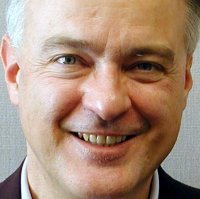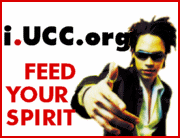Proper 22, Year A, October 2
 Lectionary and Tradition is a resource for sermon preparation, Bible study and lectio divina. This Sunday, John Calvin and Karl Barth on running the race (Phil. 3:12-14). Also, the Heidelberg Catechism on being Christ's own (Phil. 3:12).
Lectionary and Tradition is a resource for sermon preparation, Bible study and lectio divina. This Sunday, John Calvin and Karl Barth on running the race (Phil. 3:12-14). Also, the Heidelberg Catechism on being Christ's own (Phil. 3:12).Reading from Hebrew Scripture with Responsorial Psalm
Exodus 20:1-4, 7-9, 12-20 with Psalm 19 or
Isaiah 5:1-7 with Psalm 80:7-15 and
Epistle
Philippians 3:4b-14 and
Gospel
Matthew 21:33-46
Weekly Theme*
Christ's Own
[Paul] compares our life to a race-course, the limits of which God has marked out to us for running in. For as it would profit the runner nothing to have left the starting-point, unless he went forward to the goal, so we must also pursue the course of our calling until death, and must not cease until we have obtained what we seek.
Further, as the way is marked out to the runner, that he may not fatigue himself to no purpose by wandering in this direction or in that, so there is also a goal set before us towards which we ought to direct our course undeviatingly. And God does not permit us to wander about heedlessly.
Third, as the runner needs to be free from entanglement and not stop his course on account of any impediment, but must continue his course, surmounting every obstacle, so we must take heed that we do not apply our mind or heart to anything that may divert our attention but must, on the contrary, make it our endeavor that, free from every distraction, we may apply the whole bent of our mind exclusively to God's calling.
Source: John Calvin, Commentaries, vol. XXI, "Epistle to the Philippians," p. 102. Grand Rapids: Baker Books, 1998.
 Return to lectionary readings for this Sunday
Return to lectionary readings for this Sunday[Editor's summary: What happens to those who pray seriously, "thy kingdom come," and who are "running the race" towards this kingdom?]
In the power of Jesus Christ who rose again and lives for them too, and as the work of the Holy Spirit who enlightens and impels them, there takes place and has already come about in their life and history that turning of 180 degrees from the appearance of the Lord that has taken place already to that which is awaited in the future, from the kingdom of God that has already drawn near to that which is still to come in its final, universal, and definitive revelation. Praying ["thy kingdom come"] bravely means following this movement and turning, having no other choice but to look ahead and also to live and think and speak and act ahead, to run from the beginning, the history of Jesus Christ first revealed in his resurrection, to the goal, its final manifestation, the coming kingdom of God—to run toward this with all one's soul and all one's powers like one who is running a race, as Paul puts it in 1 Corinthians 9:24ff and Philippians 3:12ff. The heart of the Christian ethos is that those who are freed and summoned to pray "thy kingdom come" are also freed and summoned to use their freedom to obey the command that is given therewith and to live for their part with a view to the coming kingdom.
The coming of the kingdom of God is the appearing of God's righteousness on a new earth and under a new heaven [cf. Isa. 65:17; 2 Pet. 3:13; Rev. 21:1]. It is the setting up of his ordering of human life and life together, of his order of life, right, freedom, peace, and joy which is good for man as his creature, covenant partner, and child, which saves and keeps him. In Jesus Christ and the power of his Spirit this order is fully present already to those who know and love him. It is also fully revealed in him. In its majesty, as the grace and benefit addressed to all in him, but also as the judgment executed on all human unrighteousness and disorder, it is their hope, but it is not yet revealed even to them. Its revelation in this majesty—Jesus Christ as the sun of righteousness [Mal. 4:2], as the sun of grace which lightens all people, Christians and non-Christians, good and bad, which also illumines and enlightens them—is the new coming of the kingdom of God that is still awaited. Christians live toward this, toward its day, as they live from its first coming. To bring in this day, to cause it to dawn, to reveal God's righteousness in its majesty, cannot be the affair of any person, and therefore it cannot be the affair of the Christian, for example, through the lights entrusted to him, just as the coming into being of light on the first day of creation was not the work of the creature but solely that of its Creator, and just as the first day of Jesus Christ, the coming of the kingdom in his history and in the Easter event, was not initiated by humans, not even by God's chosen Israel among them, nor by the faith of the disciples, but solely by the free mercy of God.
Nevertheless, for those who in the power of the resurrection of Jesus Christ from the dead, enlightened by the Holy Spirit of the Father and the Son, look ahead from that beginning to this end, this cannot possibly mean that they are commanded or even permitted to be idle in the meantime; to acquiesce for the time being in human unrighteousness and disorder and their consequences, in the mortal imperiling of life, freedom, peace, and joy on earth under the lordship of the lordless powers; so far as possible to adjust themselves during the interim to the status quo; to establish themselves on this; and perhaps even with gloomy skeptical speculation to find comfort in the thought that until God's final and decisive intervention, the course of events will necessarily be not only as bad as previously but increasingly worse. No, they wait and hasten toward the dawn of God's day, the appearing of his righteousness, the parousia of Jesus Christ (2 Pet. 3:12). They not only wait but also hasten. They wait by hastening. Their waiting takes place in the hastening. Aiming at God's kingdom, established on its coming and not on the status quo, they do not just look toward it but run toward it as fast as their feet will carry them. This is inevitable if in their hearts and on their lips the petition "thy kingdom come" is not an indolent and despondent prayer but one that is zealous and brave.
But what has to happen when the prayer is prayed? What does running mean? What is the orientation and direction of Christian life and thought and word and work that corresponds to what is requested? The answer is—and along the lines that we have followed thus far no other answer is possible—Fiat iustitia ["do justice"]. That is to say, Christians are claimed for action in the effort and struggle for human righteousness. At issue is human, not divine righteousness. That the latter should come, intervene, assert itself, reign, and triumph can never be the affair of any human action. Those who know the reality of the kingdom, Christians, can never have anything to do with the arrogant and foolhardy enterprise of trying to bring in and build up by human hands a religious, cultic, moral, or political kingdom of God on earth. God's righteousness is the affair of God's own act, which has already been accomplished and is still awaited. God's righteousness took place in the history of Jesus Christ, and it will take place again, comprehensively and definitively, in his final manifestation. The time between that beginning and that end, our time as the time of the presence of Jesus Christ in the Holy Spirit, is for Christians the space for gratitude, hope, and prayer, and also the time of responsibility for the occurrence of human righteousness. They have to be concerned about the doing of this righteousness. On no pretext can they escape responsibility for it: not on that of the gratitude and hope with which they look to God and wait for his action; not on that of their prayer for the coming of his kingdom. For if they are really grateful and really hope, if their prayer is a brave prayer, then they are claimed for a corresponding inner and outer action which is also brave. If they draw back here, or even want to, then there is serious reason to ask whether and how far their gratitude, hope, and prayer are to be taken seriously.
Source: Karl Barth, The Christian Life, pp. 262-264. Grand Rapids: William B. Eerdmans, 1981.
 Return to lectionary readings for this Sunday
Return to lectionary readings for this Sunday1. What is your only comfort in life and in death?
That I am not my own,
but belong—
body and soul,
in life and in death—
to my faithful Savior Jesus Christ.
He has fully paid for all my sins with his precious blood,
and has set me free from the tyranny of the devil.
He also watches over me in such a way
that not a hair can fall from my head
without the will of my Father in heaven:
in fact, all things must work together for my salvation.
Because I belong to him,
Christ, by his Holy Spirit,
assures me of eternal life
and makes me wholeheartedly willing and ready
from now on to live for him.
Source: Heidelberg Catechism. Grand Rapids: Christian Reformed Church.
*The Weekly Theme and Focus Statement are from the ecumenical "Seasons of the Spirit" lectionary-based curriculum and preaching resource.
 Return to lectionary readings for this Sunday
Return to lectionary readings for this SundayOther lectionary preaching and study resources



1 Comments:
Would you like to use this space to share your own reflections on the readings for this Sunday? Go ahead: we'd like to hear from you.
Post a Comment
<< Home